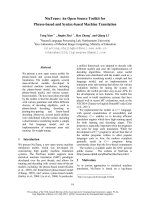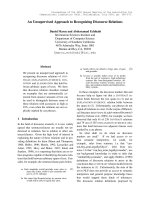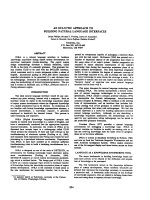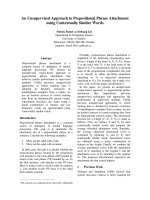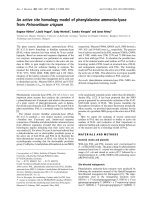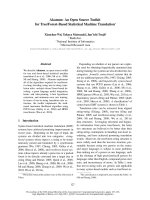Báo cáo y học: " An open letter to George M Philip, President of the State University of New York At Al" potx
Bạn đang xem bản rút gọn của tài liệu. Xem và tải ngay bản đầy đủ của tài liệu tại đây (230.25 KB, 3 trang )
An open letter to George M Philip, President of the
State University of New York At Albany
Dear President Philip,
Probably the last thing you need at this moment is
someone else from outside your university complaining
about your decision. If you want to argue that I can’t
really understand all aspects of the situation, never
having been associated with SUNY Albany, I wouldn’t
disagree. But I cannot let something like this go by with-
out weighing in. I hope, when I’m through, you will at
least understand why.
Just 30 days ago, on October 1st, you announced that
the departments of French, Italian, Classics, Russian and
eater Arts were being eliminated. You gave several
reasons for your decision, including that ‘there are com-
paratively fewer students enrolled in these degree
programs.’ Of course, your decision was also, perhaps
chiefly, a cost-cutting measure - in fact, you stated that
this decision might not have been necessary had the state
legislature passed a bill that would have allowed your
university to set its own tuition rates. Finally, you asserted
that the humanities were a drain on the institution
financially, as opposed to the sciences, which bring in
money in the form of grants and contracts.
Let’s examine these and your other reasons in detail,
because I think if one does, it becomes clear that the facts
on which they are based have some important aspects
that are not covered in your statement. First, the matter
of enrollment. I’m sure that relatively few students take
classes in these subjects nowadays, just as you say. ere
wouldn’t have been many in my day, either, if universities
hadn’t required students to take a distribution of courses
in many different parts of the academy: humanities,
social sciences, the fine arts, the physical and natural
sciences, and to attain minimal proficiency in at least one
foreign language. You see, the reason that humanities
classes have low enrollment is not because students these
days are clamoring for more relevant courses; it’s because
administrators like you, and spineless faculty, have
stopped setting distribution requirements and started
allow ing students to choose their own academic
programs - something I feel is a complete abrogation of
the duty of university faculty as teachers and mentors.
You could fix the enrollment problem tomorrow by
instituting a mandatory core curriculum that included a
wide range of courses.
Young people haven’t, for the most part, yet attained
the wisdom to have that kind of freedom without making
poor decisions. In fact, without wisdom, it’s hard for
most people. at idea is thrashed out better than
anywhere else, I think, in Dostoyevsky’s parable of the
Grand Inquisitor, which is told in Chapter Five of his
great novel, e Brothers Karamazov. In the parable,
Christ comes back to earth in Seville at the time of the
Spanish Inquisition. He performs several miracles but is
arrested by Inquisition leaders and sentenced to be
burned at the stake. e Grand Inquisitor visits Him in
his cell to tell Him that the Church no longer needs Him.
e main portion of the text is the Inquisitor explaining
why. e Inquisitor says that Jesus rejected the three
temptations of Satan in the desert in favor of freedom,
but he believes that Jesus has misjudged human nature.
e Inquisitor says that the vast majority of humanity
cannot handle freedom. In giving humans the freedom to
choose, Christ has doomed humanity to a life of suffering.
at single chapter in a much longer book is one of the
great works of modern literature. You would find a lot in
it to think about. I’m sure your Russian faculty would love
to talk with you about it - if only you had a Russian
department, which now, of course, you don’t.
en there’s the question of whether the state legis-
lature’s inaction gave you no other choice. I’m sure the
budgetary problems you have to deal with are serious.
ey certainly are at Brandeis University, where I work.
And we, too, faced critical strategic decisions because
our income was no longer enough to meet our expenses.
But we eschewed your draconian - and authoritarian -
solution, and a team of faculty, with input from all parts
of the university, came up with a plan to do more with
fewer resources. I’m not saying that all the specifics of
our solution would fit your institution, but the process
sure would have. You did call a town meeting, but it was
© 2010 BioMed Central Ltd
A Faustian bargain
Gregory A Petsko*
COMMENT
*Correspondence:
Rosenstiel Basic Medical Sciences Research Center, Brandeis University, Waltham,
MA 02454-9110, USA
Petsko Genome Biology 2010, 11:138
/>© 2010 BioMed Central Ltd
to discuss your plan, not let the university craft its own.
And you called that meeting for Friday afternoon on
October 1st, when few of your students or faculty would
be around to attend. In your defense, you called the
timing ‘unfortunate’, but pleaded that there was a ‘limited
availability of appropriate large venue options.’ I find that
rather surprising. If the President of Brandeis needed a
lecture hall on short notice, he would get one. I guess you
don’t have much clout at your university.
It seems to me that the way you went about it couldn’t
have been more likely to alienate just about everybody on
campus. In your position, I would have done everything
possible to avoid that. I wouldn’t want to end up in the
9th Bolgia (ditch of stone) of the 8th Circle of the Inferno,
where the great 14th century Italian poet Dante Alighieri
put the sowers of discord. ere, as they struggle in that
pit for all eternity, a demon continually hacks their limbs
apart, just as in life they divided others.
e Inferno is the first book of Dante’s Divine Comedy,
one of the great works of the human imagination. ere’s
so much to learn from it about human weakness and
folly. e faculty in your Italian department would be
delighted to introduce you to its many wonders - if only
you had an Italian department, which now, of course,
you don’t.
And do you really think even those faculty and adminis-
trators who may applaud your tough-minded stance
(partly, I’m sure, in relief that they didn’t get the axe
them selves) are still going to be on your side in the
future? I’m reminded of the fable by Aesop of the
Travelers and the Bear: two men were walking together
through the woods, when a bear rushed out at them. One
of the travelers happened to be in front, and he grabbed
the branch of a tree, climbed up, and hid himself in the
leaves. e other, being too far behind, threw himself flat
down on the ground, with his face in the dust. e bear
came up to him, put his muzzle close to the man’s ear,
and sniffed and sniffed. But at last with a growl the bear
slouched off, for bears will not touch dead meat. en the
fellow in the tree came down to his companion, and,
laughing, said ‘What was it that the bear whispered to
you?’ ‘He told me,’ said the other man, ‘Never to trust a
friend who deserts you in a pinch.’
I first learned that fable, and its valuable lesson for life,
in a freshman classics course. Aesop is credited with
literally hundreds of fables, most of which are equally
enjoyable - and enlightening. Your classics faculty would
gladly tell you about them, if only you had a Classics
department, which now, of course, you don’t.
As for the argument that the humanities don’t pay their
own way, well, I guess that’s true, but it seems to me that
there’s a fallacy in assuming that a university should be
run like a business. I’m not saying it shouldn’t be
managed prudently, but the notion that every part of it
needs to be self-supporting is simply at variance with
what a university is all about. You seem to value entre-
preneurial programs and practical subjects that might
generate intellectual property more than you do ‘old-
fashioned’ courses of study. But universities aren’t just
about discovering and capitalizing on new knowledge;
they are also about preserving knowledge from being lost
over time, and that requires a financial investment. ere
is good reason for it: what seems to be archaic today can
become vital in the future. I’ll give you two examples of
that. e first is the science of virology, which in the
1970s was dying out because people felt that infectious
diseases were no longer a serious health problem in the
developed world and other subjects, such as molecular
biology, were much sexier. en, in the early 1990s, a
little problem called AIDS became the world’s number 1
health concern. e virus that causes AIDS was first
isolated and characterized at the National Institutes of
Health in the USA and the Institute Pasteur in France,
because these were among the few institutions that still
had thriving virology programs. My second example you
will probably be more familiar with. Middle Eastern
Studies, including the study of foreign languages such as
Arabic and Persian, was hardly a hot subject on most
campuses in the 1990s. en came September 11, 2001.
Suddenly we realized that we needed a lot more people
who understood something about that part of the world,
especially its Muslim culture. ose universities that had
preserved their Middle Eastern Studies departments,
even in the face of declining enrollment, suddenly
became very important places. ose that hadn’t - well,
I’m sure you get the picture.
I know one of your arguments is that not every place
should try to do everything. Let other institutions have
great programs in classics or theater arts, you say; we will
focus on preparing students for jobs in the real world.
Well, I hope I’ve just shown you that the real world is
pretty fickle about what it wants. e best way for people
to be prepared for the inevitable shock of change is to be
as broadly educated as possible, because today’s back-
water is often tomorrow’s hot field. And interdisciplinary
research, which is all the rage these days, is only possible
if people aren’t too narrowly trained. If none of that
convinces you, then I’m willing to let you turn your
institution into a place that focuses on the practical, but
only if you stop calling it a university and yourself the
President of one. You see, the word ’university‘ derives
from the Latin ’universitas‘, meaning ’the whole‘. You
can’t be a university without having a thriving humanities
program. You will need to call SUNY Albany a trade
school, or perhaps a vocational college, but not a uni ver-
sity. Not anymore.
I utterly refuse to believe that you had no alternative.
It’s your job as President to find ways of solving problems
Petsko Genome Biology 2010, 11:138
/>Page 2 of 3
that do not require the amputation of healthy limbs.
Voltaire said that no problem can withstand the assault of
sustained thinking. Voltaire, whose real name was
François-Marie Arouet, had a lot of pithy, witty and
brilliant things to say (my favorite is ‘God is a comedian
playing to an audience that is afraid to laugh’). Much of
what he wrote would be very useful to you. I’m sure the
faculty in your French department would be happy to
introduce you to his writings, if only you had a French
department, which now, of course, you don’t.
I guess I shouldn’t be surprised that you have trouble
understanding the importance of maintaining programs
in unglamorous or even seemingly ‘dead’ subjects. From
your biography, you don’t actually have a PhD or other
high degree, and have never really taught or done
research at a university. Perhaps my own background will
interest you. I started out as a classics major. I’m now
Professor of Biochemistry and Chemistry. Of all the
courses I took in college and graduate school, the ones
that have benefited me the most in my career as a
scientist are the courses in classics, art history, sociology,
and English literature. ese courses didn’t just give me a
much better appreciation for my own culture; they taught
me how to think, to analyze, and to write clearly. None of
my sciences courses did any of that.
One of the things I do now is write a monthly column
on science and society. I’ve done it for over 10 years, and
I’m pleased to say some people seem to like it. If I’ve been
fortunate enough to come up with a few insightful
observations, I can assure you they are entirely due to my
background in the humanities and my love of the arts.
One of the things I’ve written about is the way
genomics is changing the world we live in. Our ability to
manipulate the human genome is going to pose some
very difficult questions for humanity in the next few
decades, including the question of just what it means to
be human. at isn’t a question for science alone; it’s a
question that must be answered with input from every
sphere of human thought, including - especially including -
the humanities and arts. Science unleavened by the
human heart and the human spirit is sterile, cold, and
self-absorbed. It’s also unimaginative: some of my best
ideas as a scientist have come from thinking and reading
about things that have, superficially, nothing to do with
science. If I’m right that what it means to be human is
going to be one of the central issues of our time, then
universities that are best equipped to deal with it, in all
its many facets, will be the most important institutions of
higher learning in the future. You’ve just ensured that
yours won’t be one of them.
Some of your defenders have asserted that this is all a
brilliant ploy on your part - a master political move
designed to shock the legislature and force them to give
SUNY Albany enough resources to keep these depart-
ments open. at would be Machiavellian (another notable
Italian writer, but then, you don’t have any Italian faculty
to tell you about him), certainly, but I doubt that you’re
that clever. If you were, you would have held that town
meeting when the whole university could have been
present, at a place where the press would be all over it.
at’s how you force the hand of a bunch of politicians.
You proclaim your action on the steps of the state capitol.
You don’t try to sneak it through in the dead of night,
when your institution has its back turned.
No, I think you were simply trying to balance your
budget at the expense of what you believe to be weak,
outdated and powerless departments. I think you will
find, in time, that you made a Faustian bargain. Faust is
the title character in a play by Johann Wolfgang von
Goethe. It was written around 1800 but still attracts the
largest audiences of any play in Germany whenever it’s
performed. Faust is the story of a scholar who makes a
deal with the devil. e devil promises him anything he
wants as long as he lives. In return, the devil will get -
well, I’m sure you can guess how these sorts of deals
usually go. If only you had a eater department, which
now, of course, you don’t, you could ask them to perform
the play so you could see what happens. It’s awfully
relevant to your situation. You see, Goethe believed that
it profits a man nothing to give up his soul for the whole
world. at’s the whole world, President Philip, not just a
balanced budget. Although, I guess, to be fair, you haven’t
given up your soul. Just the soul of your institution.
Disrespectfully yours,
Gregory A Petsko
Published: 31 October 2010
doi:10.1186/gb-2010-11-10-138
Cite this article as: Petsko GA: A Faustian bargain. Genome Biology 2010,
11:138.
Petsko Genome Biology 2010, 11:138
/>Page 3 of 3



